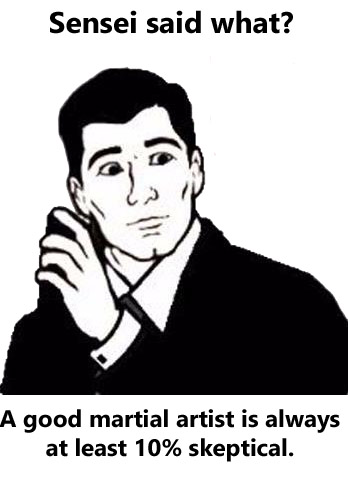 Nietzsche said, "Great intellects are skeptical." Therefore in learning, a good martial artists is always at least 10% skeptical.
Being skeptical or kaigiteki (懐疑的) enables a good martial artist to not only stay grounded but also to be a little bit curious. This curiosity is what drives a martial artist to improve themselves as they try to prove their skepticism wrong.
Nietzsche said, "Great intellects are skeptical." Therefore in learning, a good martial artists is always at least 10% skeptical.
Being skeptical or kaigiteki (懐疑的) enables a good martial artist to not only stay grounded but also to be a little bit curious. This curiosity is what drives a martial artist to improve themselves as they try to prove their skepticism wrong.
Being too skeptical and not very accepting makes one too obstinate and thus this person becomes too hard to teach and finds improving difficult.
Being too accepting and not skeptical enough makes a person too mealy because they are too believing which makes them drop their guard and enables people to take advantage of them.
All warfare is based upon deception, misdirection and surprise. Therefore in battle, a warrior is always trying to read their opponents in order to find the suki (隙) or openings. This is why they need a bit of skepticism. We are always simultaneously trying to shore up our suki and deceive our opponents into thinking they know our true intentions. When the time is right and we have misdirected them, we strike!
Thus if we are too accepting or liberal in our judging/analyzing of our opponents then we run the risk of being deceived and will accidentally show our hands.
Closing up our gaps or weak spots is a process of elimination by experimentation. In order to see our weak spots or suki, we need to be a little skeptical. This skepticism keeps us grounded and enables us to stay ahead of our opponents.
A good martial artist is someone who is accepting to a point but is also a little bit skeptical too.
